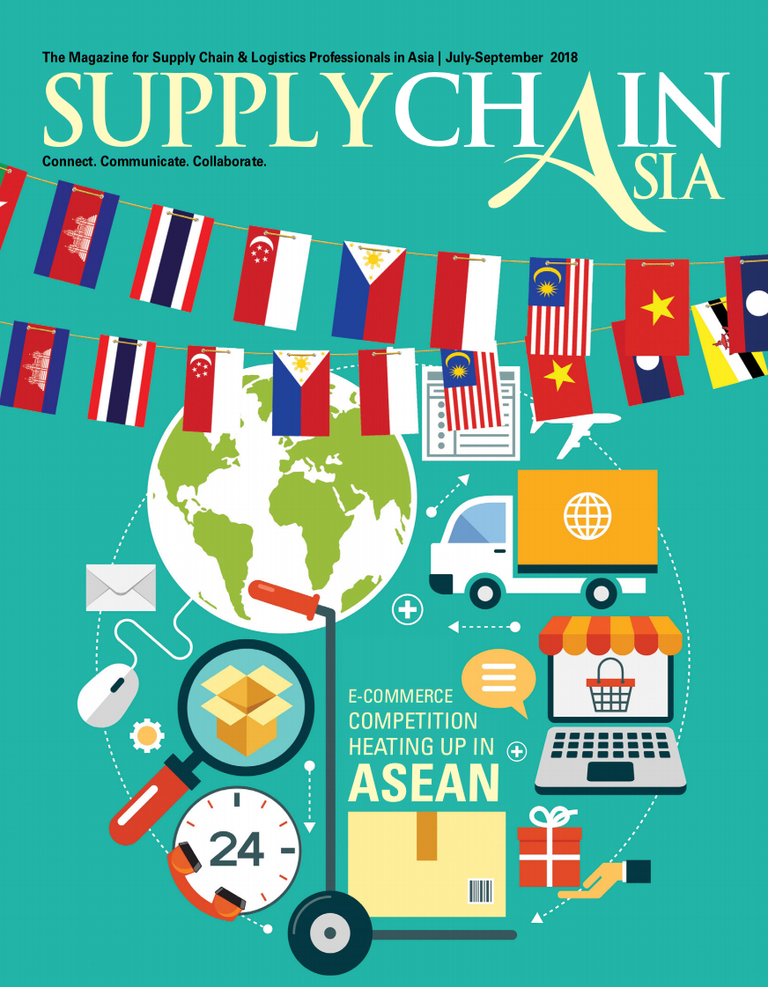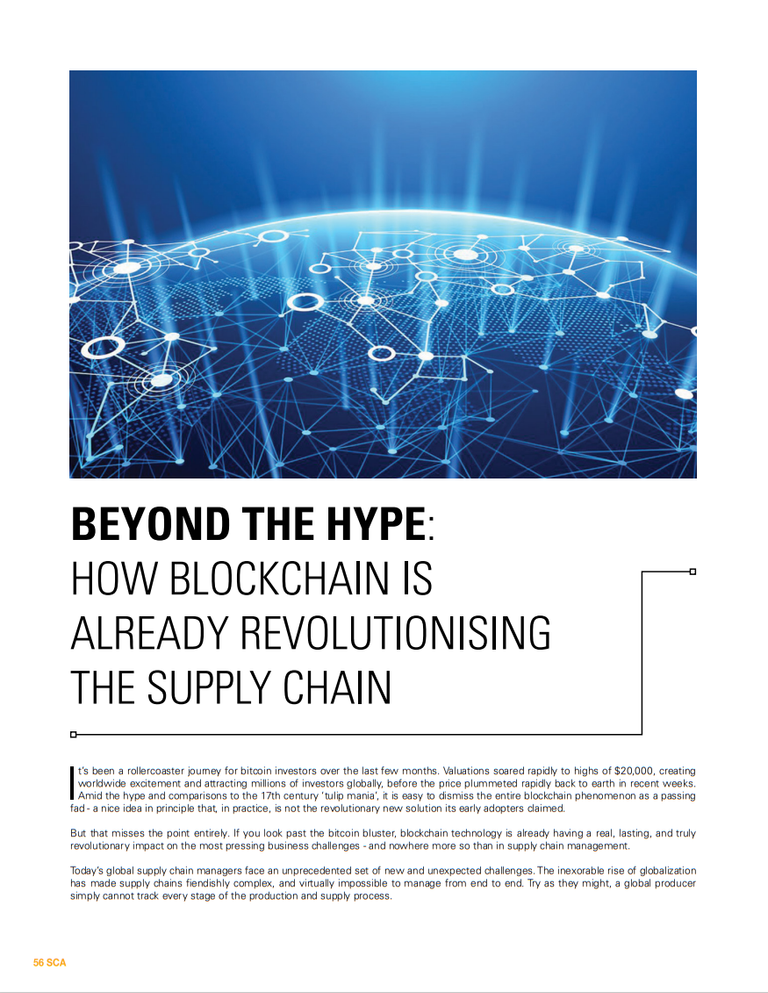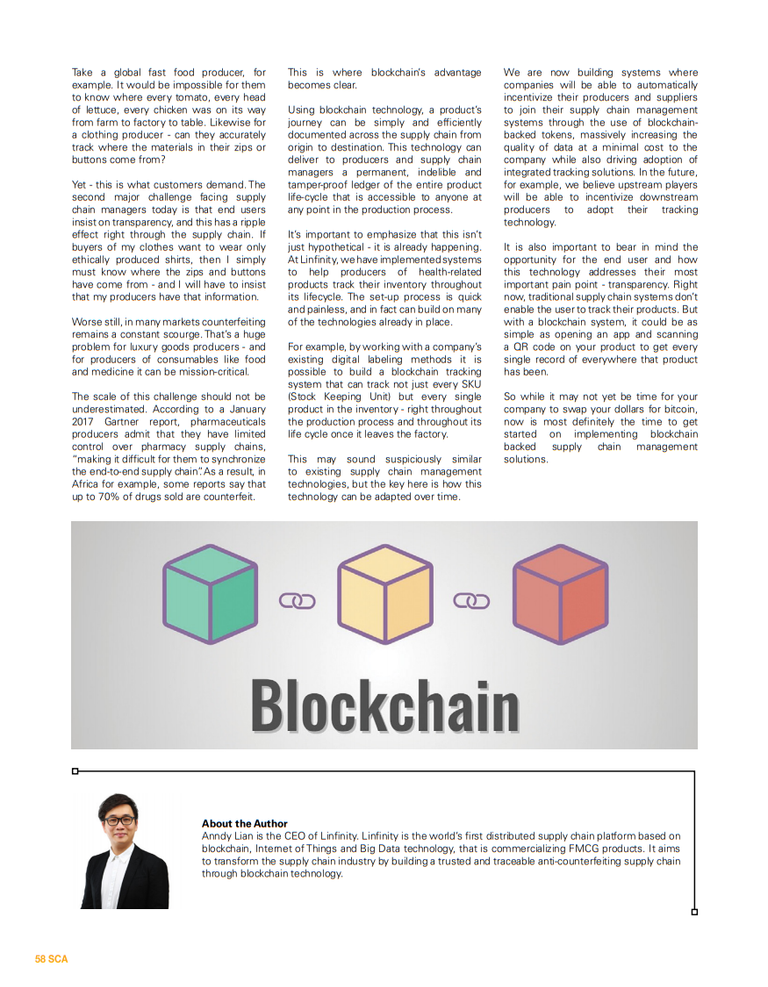
"Blockchain is indeed revolutionising the supply chain. This technology has proven its importance, especially in this COVID-19 period. Let's get started and be part of this revolution." Anndy Lian has also added that he did not know that his article was published in Supply Chain Asia Magazine in 2018. He only got to know about this when he was catching up with his previous colleague.
"When I read the article now, I think it is still very relevant. The primary risk to food security is now on a global level. Blockchain technology's track and trace is vital and will help to reduce such risks. This technology can also increase consumers' confidence level when they deal with future food sources. In order for this work, we need to let traditional companies know what this technology can do for them and blockchain companies like Ethereum, Binance Smart Chain, VeChain etc should start to drive more adoption.
You can read the full article below.
Beyond the hype: how blockchain is already revolutionising the supply chain
It’s been a rollercoaster journey for bitcoin investors over the last few months. Valuations soared rapidly to highs of $20,000, creating
worldwide excitement and attracting millions of investors globally, before the price plummeted rapidly back to earth in recent weeks.
Amid the hype and comparisons to the 17th century ‘tulip mania’, it is easy to dismiss the entire blockchain phenomenon as a passing
fad - a nice idea in principle that, in practice, is not the revolutionary new solution its early adopters claimed.
But that misses the point entirely. If you look past the bitcoin bluster, blockchain technology is already having a real, lasting, and truly
revolutionary impact on the most pressing business challenges - and nowhere more so than in supply chain management.
Today’s global supply chain managers face an unprecedented set of new and unexpected challenges. The inexorable rise of globalization
has made supply chains fiendishly complex, and virtually impossible to manage from end to end. Try as they might, a global producer
simply cannot track every stage of the production and supply process.
Take a global fast food producer, for example. It would be impossible for them to know where every tomato, every head of lettuce, every chicken was on its way from farm to factory to table. Likewise for a clothing producer - can they accurately track where the materials in their zips or buttons come from?
Yet - this is what customers demand. The second major challenge facing supply chain managers today is that end users insist on transparency, and this has a ripple effect right through the supply chain. If buyers of my clothes want to wear only ethically produced shirts, then I simply must know where the zips and buttons have come from - and I will have to insist that my producers have that information.
Worse still, in many markets counterfeiting remains a constant scourge. That’s a huge problem for luxury goods producers - and for producers of consumables like food and medicine it can be mission-critical.
The scale of this challenge should not be underestimated. According to a January 2017 Gartner report, pharmaceuticals producers admit that they have limited control over pharmacy supply chains, “making it difficult for them to synchronize the end-to-end supply chain”. As a result, in Africa for example, some reports say that up to 70% of drugs sold are counterfeit. This is where blockchain’s advantage becomes clear.
Using blockchain technology, a product’s journey can be simply and efficiently documented across the supply chain from origin to destination. This technology can deliver to producers and supply chain managers a permanent, indelible and tamper-proof ledger of the entire product life-cycle that is accessible to anyone at any point in the production process. It’s important to emphasize that this isn’t
just hypothetical - it is already happening. At Linfinity, we have implemented systems to help producers of health-related products track their inventory throughout its lifecycle. The set-up process is quick and painless, and in fact can build on many of the technologies already in place. For example, by working with a company’s existing digital labeling methods it is possible to build a blockchain tracking system that can track not just every SKU (Stock Keeping Unit) but every single product in the inventory - right throughout the production process and throughout its life cycle once it leaves the factory.
This may sound suspiciously similar to existing supply chain management technologies, but the key here is how this technology can be adapted over time. We are now building systems where companies will be able to automatically incentivize their producers and suppliers
to join their supply chain management systems through the use of blockchain backed tokens, massively increasing the quality of data at a minimal cost to the company while also driving adoption of integrated tracking solutions. In the future, for example, we believe upstream players will be able to incentivize downstream producers to adopt their tracking technology.
It is also important to bear in mind the opportunity for the end user and how this technology addresses their most important pain point - transparency. Right now, traditional supply chain systems don’t enable the user to track their products. But with a blockchain system, it could be as simple as opening an app and scanning a QR code on your product to get every single record of everywhere that product
has been.
So while it may not yet be time for your company to swap your dollars for bitcoin, now is most definitely the time to get started on implementing blockchain backed supply chain management solutions.
- Author, Anndy Lian
Magazine: SCAmag-jul-sep18v2
Screenshots:



Posted from www.anndy.com : https://anndy.com/interview/anndy-lian-featured-on-supply-chain-asia-magazine-beyond-the-hype-how-blockchain-is-already-revolutionising-the-supply-chain/